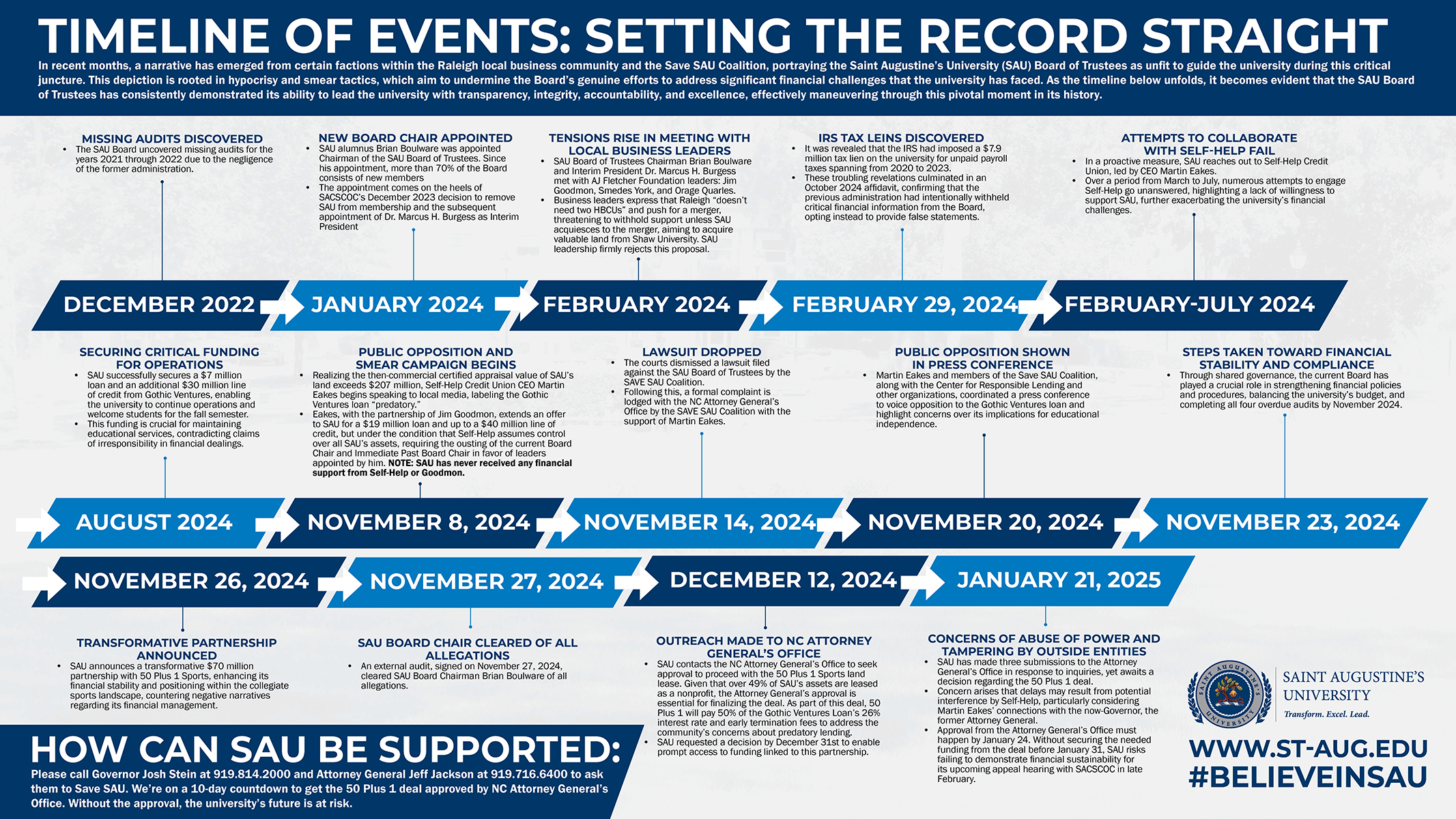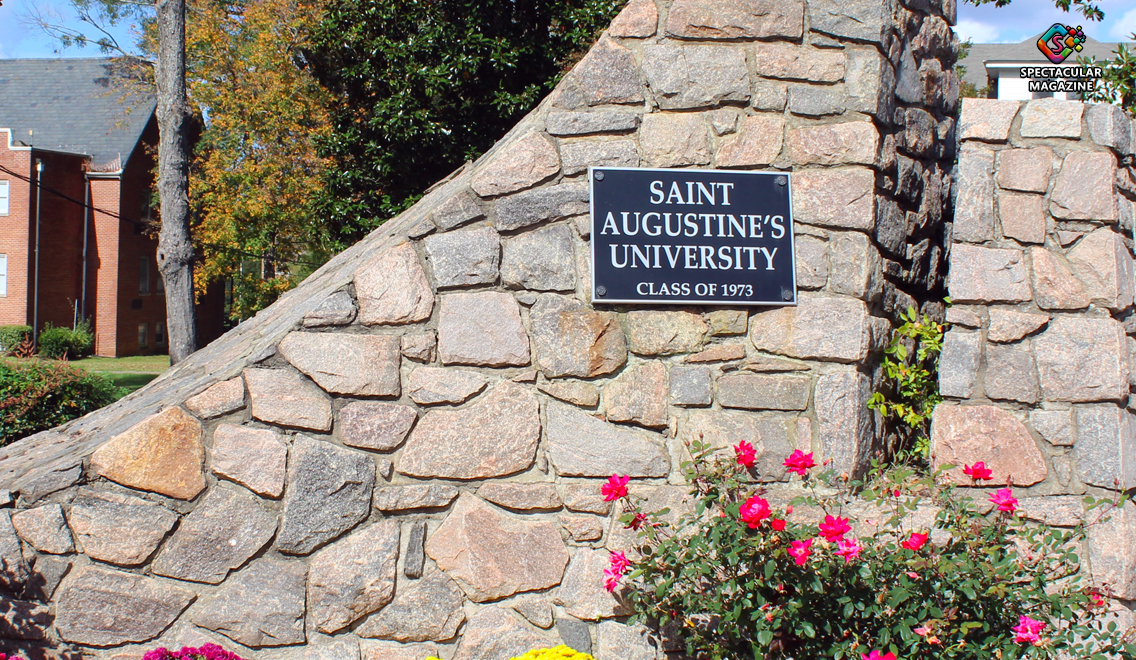University Leaders Set the Record Straight: SAU’s Timeline of Challenges and Triumphs
RALEIGH, NC – Saint Augustine’s University (SAU), one of North Carolina’s oldest historically Black colleges and universities (HBCUs), has faced mounting financial and institutional challenges in recent years. Despite ongoing criticism from certain factions in the Raleigh business community and the Save SAU Coalition, university leaders remain committed to securing a sustainable future for the institution. Here’s a look at the timeline of key events and decisions shaping SAU’s journey.

Financial Hurdles and Accreditation Issues
In December 2022, SAU was placed on probation by the Southern Association of Colleges and Schools Commission on Colleges (SACSCOC) due to failing to meet accreditation standards. The university grappled with significant financial challenges, including a $32 million debt and an IRS dispute, ultimately losing its SACSCOC membership.
However, a turning point came with a major investment from 50 Plus 1 Sports, a Black-owned development firm based in Miami. The company, which specializes in stadium and mixed-use development projects, agreed to a $70 million investment to help stabilize SAU’s finances.
A Game-Changing Partnership
50 Plus 1 Sports and SAU entered a long-term ground lease agreement, allowing the firm to develop on university property. The upfront lease payment enabled SAU to clear its debt and position itself for long-term sustainability.
The partnership outlines a revenue-sharing model, with a 65/35 split favoring 50 Plus 1 Sports for the first decade, transitioning to a 60/40 split for the subsequent 89 years. By year 50, the agreement is projected to generate over $1 billion in revenue for SAU.
“This gives the university the opportunity to carry out its mission in the community,” said Monti Valrie, founder and CEO of 50 Plus 1 Sports.
The partnership also prioritizes local workforce engagement, with most development-related jobs going to Raleigh-area residents.
Pushback from Local Business Leaders
The investment followed significant resistance from local Raleigh business leaders. In February 2024, SAU sought financial assistance from Self-Help Credit Union, a Durham-based institution dedicated to supporting communities of color. Initially, Self-Help declined, citing limited interest.
Following a property appraisal valuing SAU’s land at $207 million, Self-Help and other local investors expressed interest in providing $20-30 million in loans. However, the terms included removing SAU’s land from its ownership, replacing board members, and allowing business leaders to appoint the university’s president and board chair—all without offering SAU a share of future revenue.
In a June 2024 letter, SAU Board Chair Brian Boulware described additional pressures. During a meeting with influential Raleigh leaders, including a television station owner, a newspaper editor, and a local developer, the group proposed merging SAU with Shaw University.
“Raleigh doesn’t need two Black universities,” one leader reportedly said. “We need them both on SAU’s property because we need downtown land to expand the development footprint.”
University leaders rejected these proposals, opting instead for a short-term financial solution to maintain operations and payroll.
A Controversial Loan
In a critical move, SAU secured a $7 million loan from Gothic Ventures, LLP, to address immediate financial needs. The loan, which carries a 24% interest rate and a 2% management fee, has drawn criticism. Martin Eakes, CEO of Self-Help Credit Union, labeled the loan “abusive” and “predatory” in an interview with WUNC.
However, Valrie defended SAU’s decisions, pointing to the lack of willing financial partners. “When you look deeper, there wasn’t anybody willing to help the university,” he said.
The Path Forward
The agreement with 50 Plus 1 Sports represents a promising future for SAU. Board Member Sophie Gibson emphasized that the partnership resolves the university’s debt, establishes a sustainable revenue model, and creates opportunities for students and the broader Raleigh community.
The university is currently awaiting approval from the North Carolina Attorney General to finalize the agreement. Meanwhile, SACSCOC has requested additional documentation regarding SAU’s financial sustainability by January 25, 2025.
Despite obstacles, SAU leaders remain optimistic about the future. “This is about securing the legacy of Saint Augustine’s University,” Gibson said, “and ensuring that it continues to serve as a beacon of education, community engagement, and opportunity for generations to come.”


